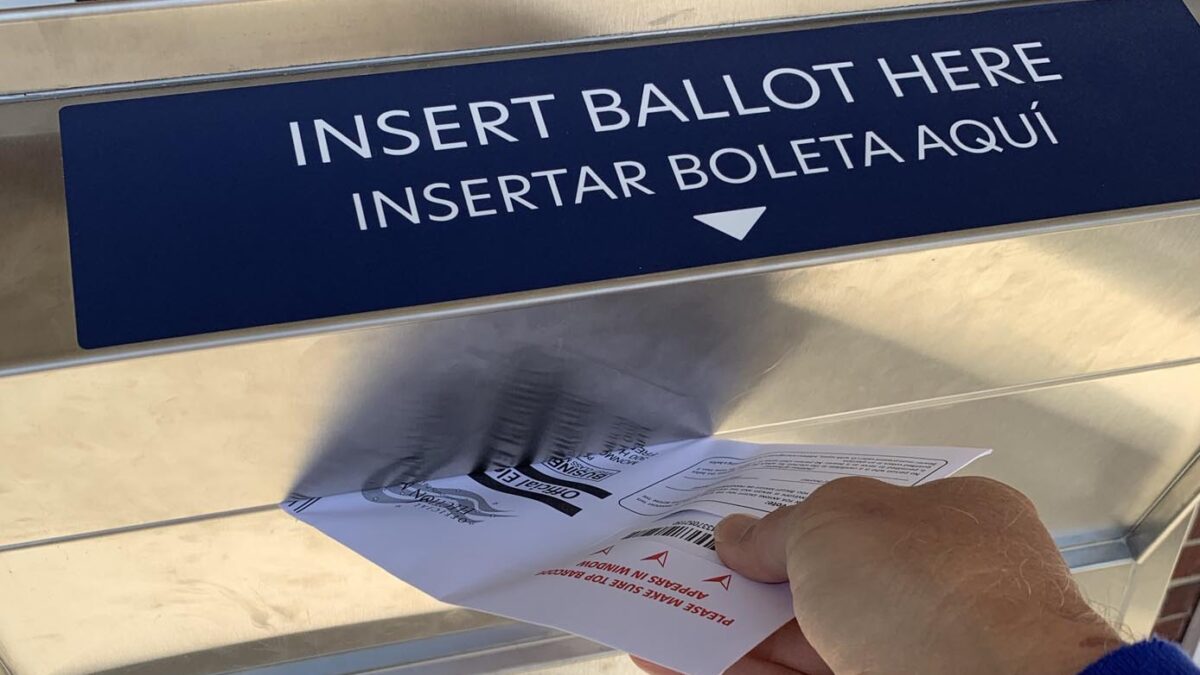Joe Biden’s signing of the Consolidated Appropriations Act of 2023 may, in effect, be null and void by day’s end if a federal judge in Lubbock, Texas, agrees with the state’s attorney general that the $1.7 trillion spending bill was never validly enacted because the House of Representatives lacked a constitutionally mandated quorum.
The bench trial in this hugely important case, State of Texas v. Dept. of Justice, begins at 10:30 a.m. Eastern on Monday before district court Judge James Hendrix — a Trump appointee who was first nominated by Barack Obama.
Here’s your lawsplainer so you can follow along with the developments.
Pelosi Playing Fast and Loose with the Constitution
On Feb. 15, 2023, Texas Attorney General Ken Paxton filed suit in State of Texas v. Dept. of Justice, challenging the constitutionality of the Consolidated Appropriations Act of 2023. As Paxton’s lawsuit explained, the omnibus spending bill originated in the House of Representatives as Resolution 2617. After the lower chamber passed H.R. 2617 in September 2021, the bill went to the Senate, which passed a different version of the bill in November 2022.
Because the spending bills differed, Congress needed to reconcile them, with each body then required to pass the amended version. On Dec. 22, 2022, the Senate approved the House’s amendments to the bill, with the House meeting the next day to consider the Senate’s changes.
As I explained shortly after Paxton sued the Biden administration, here’s where the constitutional problem arose:
When the House met on Dec. 23, 2022, to vote on the Consolidated Appropriations Act, it lacked a quorum to conduct business. Only 201 of the representatives were present. Nonetheless, the House proceeded with the vote. But it didn’t just count the votes of the present members. It added to the tally an extra 226 votes, cast by present House lawmakers on behalf of absent ones who had appointed them ‘proxies.’
While the votes of those physically present totaled 88 yeas and 113 nays, the House clerk recorded that the bill passed by a margin of 225 yea, 201 nay, and 1 present, relying on a rule originally adopted in May of 2020 that allowed members to ‘designate[] another Member as a proxy’ to ‘cast the vote’ of the designating Member if ‘a public health emergency due to a novel coronavirus is in effect[.]’
Then, on Dec. 29, 2022, Biden signed the Consolidated Appropriations Act, providing for appropriations through the fiscal year ending on Sept. 30, 2023.
The Quorum Clause Issue
In his lawsuit, Paxton argued that because the House proxy rule violates the quorum clause of the Constitution, which Texas maintains requires a member’s physical presence, the Consolidated Appropriations Act never became law.
The quorum clause, found in Article I of the U.S. Constitution, provides:
Each House shall be the Judge of the Elections, Returns and Qualifications of its own Members, and a Majority of each shall constitute a Quorum to do Business; but a smaller Number may adjourn from day to day, and may be authorized to compel the Attendance of absent Members, in such Manner, and under such Penalties as each House may provide.
Whether that provision requires the physical presence of members of the House to vote on legislation or allows the House to authorize voting by proxy is the bottom-line question at Monday’s trial.
Texas Is Right: Proxy Voting Is Verboten
From an originalist perspective, which looks at the text, structure, and original understanding of the Constitution, Texas’ quorum clause argument is correct.
It would make little sense for the Constitution to expressly say that if a quorum were lacking, the House was “authorized to compel the Attendance of absent Members,” if proxy voting were allowed. Further, as Paxton’s complaint notes, “delegates at the Constitutional Convention rejected proposals that would have allowed Representatives to ‘vote by proxy.’” The founders had also previously rejected proxy voting during debates over the Articles of Confederation, further illustrating that only those physically present counted for purposes of a quorum.
The Supreme Court has also held that to conduct congressional business, the Constitution requires a majority of members to be “actually and physically present.” This aligns with the meaning of “present” at the founding: “not absent; face to face; being at hand.” Other constitutional provisions, such as record-keeping requirements and impeachment rules in the Senate, indicate the need for physical presence.
Congress’s operations over the two centuries before Covid-19 lockdowns, including during various national emergencies, further establish that the quorum clause requires the physical presence of lawmakers. As Texas highlighted in its lawsuit:
During the Yellow Fever epidemic, Thomas Jefferson urged President Washington to keep Congress sitting in Philadelphia, then the capital, even if it meant meeting ‘in the open f[ie]lds.’ … [I]n the aftermath of that epidemic, the Third Congress enacted a law — still in force today — stating that ‘[w]henever Congress is about to convene, and from the prevalence of contagious sickness, or the existence of other circumstances, it would, in the opinion of the President, be hazardous to the lives or health of the members to meet at the seat of Government,’ the President could ‘convene Congress at such other place as he may judge proper.’
There would be no reason to meet “in open fields” or to “convene Congress at such other place as he may judge proper” if the House and Senate could instead opt for proxy voting without the attendance of elected officials. Further, through the Civil War, the Spanish flu pandemic, the Cold War, and the 9/11 terrorist attacks, Congress continued to meet in person.
Texas Is Right, So Now What?
This long-settled and established practice, coupled with the text and structure of the Constitution, confirms the quorum clause requires the physical presence of elected lawmakers. But only 201 members were physically present in the House on Dec. 23, 2022, meaning the legislative body lacked a quorum “to do business.” Consequently, the House could not — and did not — pass the Consolidated Appropriations Act.
So does that mean the entire $1.7 trillion omnibus spending bill is unconstitutional?
Yes and no: Because the quorum clause, properly interpreted, required the physical presence of a majority of members “to do business,” and because the House lacked the requisite quorum when it purported to pass the Consolidated Appropriations Act of 2023, the $1.7 trillion spending bill was unconstitutionally “enacted.”
But Texas is only challenging two aspects of the Consolidated Appropriations Act and seeks only declaratory and injunctive relief related to those two provisions. Specifically, Paxton seeks a ruling that the legislation’s expansion of Title VII’s anti-discrimination provision to require employers, including Texas, to provide “reasonable accommodations” to “limitations related to the pregnancy, childbirth, or related medical conditions of a qualified employee,” is null and void. While Texas maintains it already provides such “reasonable accommodations,” this amendment to Title VII harms the state by increasing litigation and other costs when employees wrongly believe Texas denied them a reasonable accommodation, the state argues.
Second, the Lonestar State challenges the $20 million appropriated to fund nonprofits and local governments to connect illegal aliens released by Immigration and Customs Enforcement with various social services. This appropriation further encourages illegal immigration and burdens Texas’ education, health care, and other costs, according to the state.
If Texas prevails following Monday’s bench trial, the court’s ruling would be limited to those two provisions of the Consolidated Appropriations Act of 2023. However, to strike those two portions of the omnibus spending bill, the federal court would first need to conclude that the House violated the quorum clause and thus never constitutionally passed the law.
Consequences of a Texas Win
Because Paxton’s complaint is narrow, a win for Texas will have limited reach. And because the Biden administration will appeal any adverse decision, by the time a decision is final, the fiscal year ending Sept. 30, 2024, will have come and gone. That means the $1.7 trillion will already have been spent, and both the $20 million appropriated to the pilot program to assist illegal aliens and every other dollar “authorized” by the omnibus spending bill will be history.
That will not be the end of the case, however, because of the so-called Pregnant Workers’ Fairness Act that Congress shoehorned into the spending legislation. That portion of the omnibus bill had nothing to do with appropriations and instead amended the substantive portions of Title VII. So even after all the money is spent, there will be one aspect of the Consolidated Appropriations Act of 2023 that could be stricken.
Knowing that ruling in Texas’ favor won’t affect any of the $1.7 trillion in the spending bill should assuage any practical concerns Judge Hendrix may have that the bill is too big to declare unconstitutional. And while striking the amendment to Title VII will have some ramifications, Congress can always re-up the “reasonable accommodation” provision, although that is unlikely with the current red House.
Yet the consequences of ruling in Texas’ favor would still be huge because it would be a declaration by a federal court that a majority of members of Congress and President Joe Biden violated their duty to faithfully execute the laws of the United States — and did so to the tune of $1.7 trillion.
Ruling against Texas, though, would be equally significant — but devastatingly so — because it would be a sign to our country that the judicial branch is unwilling to operate as a check on the other two branches of government. If Judge Hendrix and the appellate courts ignore the quorum clause or sidestep the constitutional issue, which is more likely, they will declare to Americans that our Constitution and the rule of law mean nothing.
“Many Americans may not even know that fewer than half the House members were present when Congress passed the largest spending bill in the history of our country. This was a flagrant violation of the Constitution. The relief sought in this case is narrow, but it is a matter of principle that we uphold our Constitutional order, and make clear that the federal government must never do this again,” Paxton told The Federalist.
Logistics of Monday
In pretrial haggling, the parties agreed on the logistics of the trial, with Texas and the Biden administration both agreeing to present their cases based on written declarations submitted by the parties, along with other documentary evidence. No witnesses will be called, according to a person familiar with the case, with both sides also waiving opening statements.
The bench trial before the district court judge will proceed, The Federalist has learned, with each side essentially presenting closing statements that highlight the evidence that the court has already admitted in advance of Monday’s hearing. Arguments will begin at 10:30 a.m. ET, with Texas allocated one hour to address issues of “justiciability,” which concerns whether Paxton’s lawsuit is one appropriate for the court to consider. The Biden administration will then have an hour to counter Paxton’s legal arguments. Texas will have another hour to address the merits of its quorum clause argument, along with the arguments concerning the appropriate remedy. And the Biden administration will again have an hour to counter Paxton’s legal team. Texas, as the plaintiff, will have the opportunity to provide a rebuttal to end the argument.
The ‘Justiciability’ Punt
Since the first two hours will focus on the question of ‘justiciability,’ watch for a punt by the court because if Judge Hendrix finds the case is “non-justiciable,” he will never reach the merits of the quorum clause question.
We will soon know whether our Constitution and the rule of law will crumble under the exigency of circumstances or the desires of politicians.









